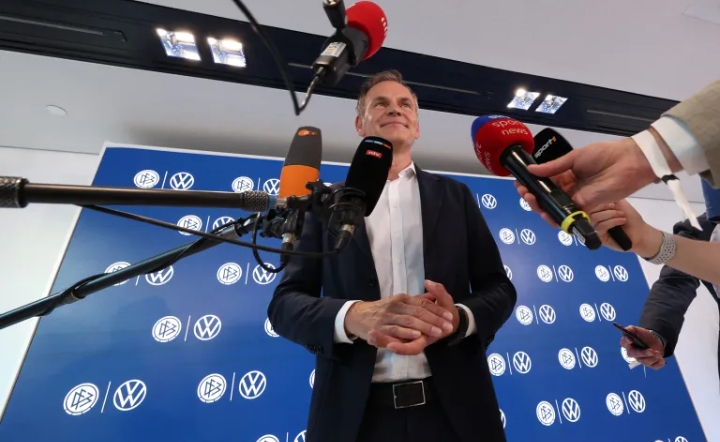Amid rising tensions, angry workers chanted "we are Volkswagen, you are not" as company management attempted to justify €10 billion in planned cuts. The German government, recognizing the importance of Volkswagen to the national economy, has prioritized efforts to save the company.
Volkswagen Clashes with Workers Over €10 Billion in Cost Cuts


Volkswagen's leaders expressed urgency during a tense meeting with workers on Wednesday, stating that the company has "one, maybe two" years to turn its primary brand around. This meeting came just two days after Volkswagen announced significant cost-cutting measures and factory closures.
At the meeting, held at the company’s Wolfsburg headquarters, many of the 16,000 assembled workers greeted finance chief Arno Antlitz with whistles and shouts of "we are Volkswagen, you are not" and "auf Wiedersehen." Antlitz explained that Europe's car market had significantly contracted following the COVID-19 pandemic, leading to a demand shortfall of around 500,000 vehicles, which is equivalent to the output of approximately two factories.
Antlitz emphasized that the current market conditions were challenging, saying, "The market is just not there." He stressed that it was a joint responsibility of both workers and management to navigate the transition to a primarily electric vehicle fleet, which would require further cost reductions.
In response, Daniela Cavallo, the works council chief, accused management of "massively damaging trust" and likened the threats of plant closures to a "declaration of bankruptcy." She also criticized Volkswagen Group CEO Oliver Blume, alleging that he was prioritizing a €5-billion ($5.5-billion) software deal with the U.S. firm Rivian over safeguarding German jobs. Cavallo demanded that Blume, who was not initially scheduled to speak, defend his actions.
The challenges at Volkswagen highlight broader issues facing German businesses. Stagnant economic growth, inflation, and increased international competition have raised concerns about the future of Europe's largest economy.
Already under pressure from losses in state elections, the coalition government led by Chancellor Olaf Scholz has made Volkswagen a central focus. On Wednesday, Scholz's cabinet was expected to approve a proposal for tax reductions aimed at boosting demand for electric vehicles.
Earlier in the week, Volkswagen announced plans to end a long-standing agreement with workers that guaranteed job security at six of its factories. This move is part of a €10 billion ($11 billion) cost-cutting initiative. The company’s executives are targeting a 6.5% profit margin by 2026, a significant increase from the 2.3% margin reported in the first half of 2024.

 বাংলা
বাংলা  Spanish
Spanish  Arabic
Arabic  French
French  Chinese
Chinese 
